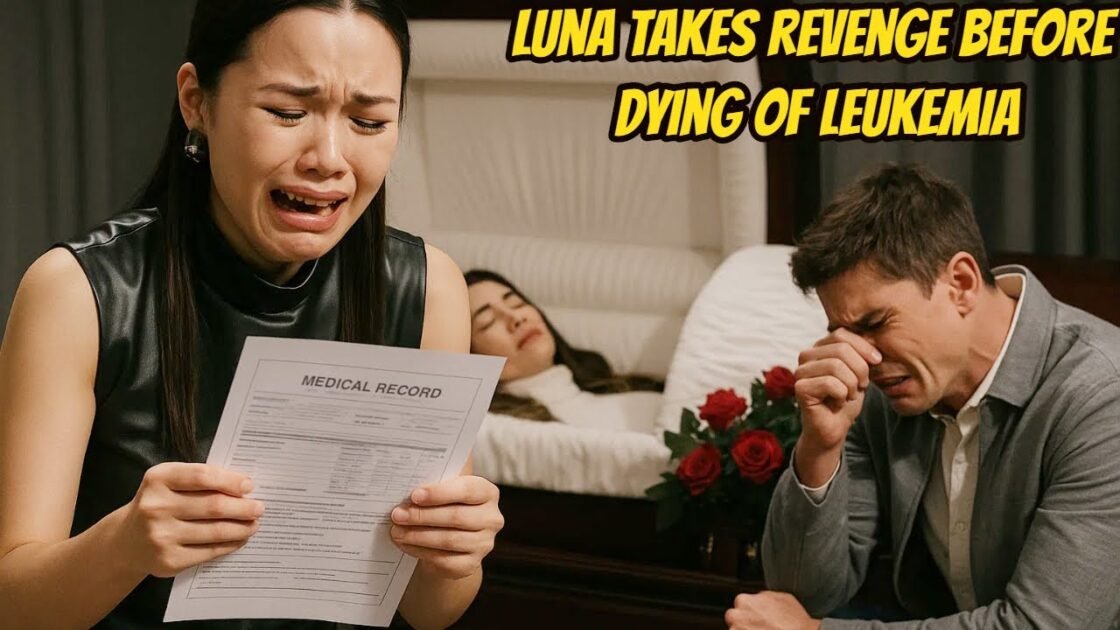In the dim glow of Remy’s apartment, Luna stood trembling, her eyes hollow and heavy with a truth no one was prepared to hear: “Leukemia, final stage. Just days left.” Her voice was steady, chilling in its calm acceptance—not of death itself, but of dying with unfinished business. For Luna, unfinished business meant revenge.
Years of circling the Forester family’s empire—their wealth, their lies, their ruthless grip on power—had led to this moment. But above all, it was Stephanie “Stuffy” Forrester, the iron-willed matriarch who wielded control like a weapon, who burned hottest in Luna’s heart. Stuffy had not only blocked Luna’s chance at reconnecting with Finn, the man who might have been her father, but had deliberately severed that bond before it could form—a cruel theft of identity and belonging.
Now, with nothing left to lose, Luna revealed a gun to Remy—a cold, black steel symbol of final judgment. Remy did not recoil. The two were dark souls scarred by shared pain. He understood that Luna was not asking for mercy, only justice: pain for pain.
Together, they set their sights on Stephanie’s cliffside mansion, a fortress of privilege and denial. Luna knew the layout intimately, having watched from the shadows. The security system was a mere façade, symbolic of a family that believed themselves untouchable.
On a quiet night, with the crashing ocean waves masking her steps, Luna slipped inside. Hayes, the young boy bearing the warmth of Finn and the fire of Stephanie, lay asleep on the couch. Luna paused, the innocence of the child clear to her. This night was not for him—it was for the woman upstairs.
Stephanie, absorbed in her reading, was blindsided by the single, deafening gunshot that shattered the night. Blood spread across the pristine sheets of her bedroom—the perfect life unraveling in a heartbeat.
But the tragedy was not over. Hayes appeared in the doorway, silent, wide-eyed. Luna raised the gun again—not out of hatred, but to end the cycle, to prevent another legacy of cruelty. Yet, for the first time, hesitation gripped her. Her finger trembled on the trigger.
Then Remy arrived. He grabbed her wrist, forcing the gun down. “Enough,” he said, voice rough and broken. “You made them bleed. Now live… just a little longer. Run.”
Luna fled as sirens wailed in the distance—an ominous soundtrack to the collapse of a dynasty. Despite Remy’s efforts to cover her tracks, she was caught before crossing town limits, arrested and bloodied—a symbol of violent reckoning.
The aftermath devastated the Forester family. Finn was shattered—his wife and son lost in one brutal night, his chance to claim Luna forever denied by the walls Stephanie built. His torment was endless: what if he had accepted Luna? Would peace have been possible instead of vengeance?
The Forester empire fractured under the weight of rage, denial, and sorrow. Ridge vowed justice. Taylor struggled to accept another daughter lost. Thomas burned with silent fury. The family that once commanded respect now faced public humiliation and private collapse.
Meanwhile, Luna awaited trial, refusing to speak except to Remy. In their brief, glass-separated moments, she asked not for forgiveness but for the truth to be told—raw, unfiltered, and unvarnished. Remy vowed to tell her story, even if it destroyed him.
Rumors swirled of conspiracy—that Remy had orchestrated the attack, not merely witnessed it. Police combed surveillance and phone records, tightening the net. Yet Remy stood firm, ready to face consequences alongside Luna, bound by shared scars and shattered loyalties.
In her final days, Luna’s request was simple: she did not want Remy to pay for her choices. She wanted him to survive, to carry her truth and remember.
The story culminated not in a final shot, but in silence. Luna, a girl with nothing left, dismantled a kingdom with bare hands and now sat alone in a cold cell—her fate uncertain, her name poised between erasure and immortalization.
Finn, standing on the same cliff where everything crumbled, was haunted by a question he could never answer: Was Luna truly his daughter? And if she was, had his denial doomed her?
There were no neat endings. Only blood-stained marble floors, echoes in empty hallways, and a legacy tainted beyond repair.
The Bold and the Beautiful was never just a tale of fashion or romance. It was a story about power, vengeance, and the corrosive decay when love turns to hate unchecked.
Luna did not fade quietly—she detonated.
Her last moments were spent in a prison cell, body wasting under leukemia’s relentless grip. She pleaded to see Finn once, to hear him call her daughter before the end. When the meeting finally came, Finn’s response shattered her fragile hope: “You may be my blood, but you’re not my daughter. My daughter wouldn’t murder her way into my life.”
Broken and abandoned, Luna died alone—her passing a silent scream echoing through a family’s ruin.
Finn sat among Hayes’s untouched toys, frozen in grief and haunted by a single unspoken word: daughter.
That word never came. But its absence will echo forever.















































































































